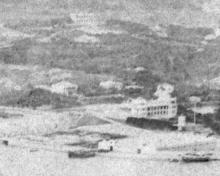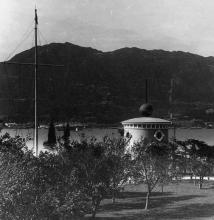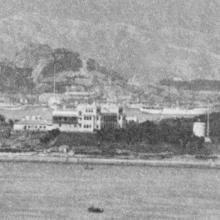The dropping of the time-ball gave a visual signal that could be seen from ships in harbour, so a ship's chronometer could be set while it was still on board the ship.
This allowed sailors to make sure their chronometers were set to the correct time before sailing out into the open sea. In the days before GPS, knowing the correct time was essential to allow sailors to calculate their location when they were out of sight of land.
Before this time-ball tower was introduced, sailors whould have to carry their chronometer ashore to set it to the correct time by matching its time to an accurate clock.
It went into service on 1st January, 1885, as described in this Government Notification:
GOVERNMENT NOTIFICATION.-No. 12.
The following Notice from the Government Astronomer is published for general information.
By Command,
W. H. Marsh,
Colonial Secretary.
Colonial Secretary's Office, Hongkong, 10th January, 1885.
------------------------------------------
NOTICE.
From the first day of January, 1885, the Electric Time-ball by S. A. Varley is dropped daily at 1 p., Sundays and holidays excepted, at Tsimshatsui by the Mean Time Clock at the Observatory.
The hoisting of the ball commences at 12h 55m. It remains half mast till 12h 57m when it is hoisted to the top. It is dropped at 1h 0m 0s.0 Hongkong Civil Time, and 17h 23m 18s.1 Greenwich Mean Time.
In the event of the current failing at 1 p., the ball will be lowered slowly, and, if possible, be dropped at 2h 0m 0s.0 p.
Hongkong Civil Time is henceforth counted from the meridian of the Observatory, i.e. the meridian passing through the middle of the transit instrument and through the middle of the white meridian-mark erected, 11354 feet south of the transit instrument on the side of the hill above Wantsai.
The time-ball will enable Masters of Vessels to examine and rate their chronometers without taking them on shore.
W. Doberck,
Government Astronomer.
Hongkong Observatory, 1st January, 1885.
Over time, new buildings were erected around this time-ball tower, which hid it from the view of the ships in the harbour. A new time-ball tower was built on Signal Hill, and went into operation in 1908. The new, higher location meant that the time-ball was visible to ships again.
After the new time-ball on Signal Hill was operational this original tower went out of use, though the older building was not demolished and is still standing today.


